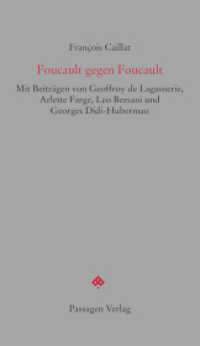- ホーム
- > 洋書
- > ドイツ書
- > Social Sciences, Jurisprudence & Economy
- > Social Sciences
- > social sciences in general
Full Description
This book presents a variety of narratives on key elements of academic work, from data analysis, writing practices and engagement with the field. The authors discuss how elements of academic work and life - usually edited out of traditional research papers - can elicit important analytical insight. The book reveals how the unplanned, accidental and even obstructive events that often occur in research life, the 'detours', can potentially glean important results.
The authors introduce the process of 'writing-sharing-reading-writing' as a way to expand the playground of research and inspire a culture in which 'accountable' research methodologies involve adventurousness and an element of uncertainty. Written by scholars from a range of different fields, academic levels and geographic locations, this unique book will offer significant insight to those from a range of academic fields.
Contents
1. Editors' Introduction: The Power of 'Showing How it Happened'; Charlotte Wegener, Ninna Meier and Elina Maslo.- Part I: Different vantage points, new insights.- 2. The Wonder of Things as They Are. Theorizing Obesity and Family Life with Art; Lone Grøn.- 3. Into the wild time: notes from a traveller; Christina Berg Johansen.- 4. That's responsibility; Chris Smissaert.- Part II: Research life - life & research.- 5. In Between: Creative Spaces and Detours as Part of a Researcher's Life; Lene Tanggaard.- 6. An Unexpected Detour from Ivory Tower to Action Research; Jody Hoffer Gittel.- 7. Deliberate detours as paths to emergent knowledge creation; Karen Ingerslev.- 8. Worth, wonder and worry in the accelerated academy; Rasmus Hoffmann Birk.- 9. There is no such thing as a journal paper; Sarah Gilmore and Nancy Harding.- Part III: How we know: making sense of methods and field work.- 10. The unanticipated outcomes of research: Learning and development at work; Stephen Billett.- 11.Knowing across time and place; Ninna Meier.- 12. Staying on topic: doing research between improvisation and systematisation; Constance de Saint-Laurent.- Part IV: Coping with complexity: writing to understand what we do.- 13. Metaphorical structuring of pattern analysis; Camilla Kølsen Petersen.- 14. Telling tales of the unexpected; Elisabeth Willumsen.- 15. Writing my way home; Charlotte Wegener.- 16. Riding the waves of collaborative-writing-as-inquiry: some ontological creative detours; Ken Gale and Jonathan Wyatt.- 17. "Give it a name and it will be yours": How opportunities to reflect on essential questions can create space for learning; Elina Maslo.- 18. Confessions of a procrastinator; Noomi Matthiesen.- 19. Epilogue or why creative detours (often) have happy endings; Vlad Petre Glăveanu.- Index.







